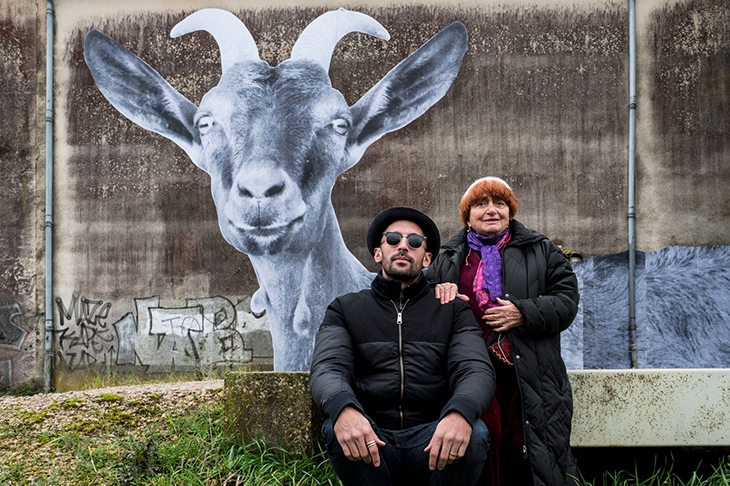Faces Places is a documentary directed by Agnès Varda in collaboration with JR, the famous Parisian photographer and muralist (although, if you’re as shallow as I am, your first thought may also have been: how is this possible now that Larry Hagman is dead?). The pair visit small towns in France, meeting ordinary people, taking their photograph, blowing the photographs up huge, and pasting them outdoors on buildings and barns and trains. It sounds arty-farty, and I suppose it is, but it is also a mesmerising meditation on lives lived, friendship, ageing and mortality. Plus it throws in this fact for good measure: Jean-Luc Godard can be a total bastard. I didn’t see that coming, I must say.
Varda is commonly described as ‘the godmother of the French New Wave’, which may be something of an insult, as she always played such an integral part. Her 1962 film Cléo from 5 to 7 remains as fresh and riveting as ever — but the fellas have hogged the limelight. (The late, great film critic Roger Ebert said that the reason she is not routinely included along with Godard and Truffaut and Rohmer et al. is plainly ‘because she’s a woman’.) She is now 90, and a decade ago she made an autobiographical film, The Beaches of Agnès, in which she described herself as ‘a little old lady, pleasantly plump’. That still holds true, except that she now has fascinating hair: a pageboy that’s white on top and dark red below. In some shots, she looks like a scuttling mushroom.
Meanwhile, JR is 35, dishy, wears sunglasses at all times and does not dig for oil. Instead, he drives her around in his van, which is also a photo booth with a large-format printer.
Their first trip is to a former coal-mining town, where they meet Jeannine, who is holding out in a row of miners’ cottages due to be demolished. She is the last inhabitant. She shares her memories: how her mother would wash her father’s grimy back; how she would clamour to see if he’d bought back any of his lunch (buttered bread) from the mine; and how it was delicious even though it was covered in soot. They photograph Jeannine, blow up the picture dozens of feet high, then paste it on to the exterior of her house. Jeannine cries. She is moved to see herself celebrated and commemorated in this way. It wasn’t exactly what she anticipated when she woke up that morning. And you will be moved too.
The pair press on, meeting dockers and farmers and waitresses and factory workers. They poke about in lives that are always interesting, because every life is interesting, although we often forget that. Varda’s relationship with JR is playful and affectionate. He teases her about her old toes, which he then photographs and turns into billboards. She teases him about the sunglasses. Godard always wore sunglasses. It drove her mad. ‘I like to see a face!’ They are also freewheeling. When she asks him about why he’s so nice to old people, he says he grew up with his grandmother, who is now 100. So off they go to visit his grandmother. This is a film that puts old women centre stage and it’s the best film that puts old women centre stage since… nope, can’t think of one.
There is warmth and humour but mostly it is elegiac. Varda’s eyesight is failing and when they climb up to a water tank, she can’t make all the stairs. Death is never far away. She remembers her late friend, Guy Bourdin, himself a photographer, by creating a mural pasted on to an old German bunker that has toppled from the cliff on to the beach. But by morning it has gone, the tides having washed it away. They visit the grave of Henri Cartier-Bresson, where JR asks her if she is scared of dying. ‘I don’t know,’ she says. ‘I don’t think I’m afraid but I might be at the end.’ Yet at the same time the film is full of life. They replicate a scene from Godard’s Band of Outsiders, the one where his characters race through the Louvre. Here, JR pushes Varda in a wheelchair, but at breakneck speed. She is thrilled.
Finally, they end up in Rolle, Switzerland, as Varda wants JR to meet Godard, who lives there. Godard had known they were coming, and what follows upsets Varda bitterly. Can’t go into detail, as that would be spoilery, but I will say that she deserved better. Always has done.






Comments